-
 Bitcoin
Bitcoin $111,548.1016
2.37% -
 Ethereum
Ethereum $2,781.2216
6.39% -
 Tether USDt
Tether USDt $1.0004
0.01% -
 XRP
XRP $2.4146
4.58% -
 BNB
BNB $669.5226
1.36% -
 Solana
Solana $157.5751
3.99% -
 USDC
USDC $1.0002
0.02% -
 TRON
TRON $0.2899
0.84% -
 Dogecoin
Dogecoin $0.1821
6.47% -
 Cardano
Cardano $0.6259
6.40% -
 Hyperliquid
Hyperliquid $41.0040
5.60% -
 Sui
Sui $3.0919
6.42% -
 Bitcoin Cash
Bitcoin Cash $515.6573
2.88% -
 Chainlink
Chainlink $14.3144
2.51% -
 Stellar
Stellar $0.2885
11.60% -
 UNUS SED LEO
UNUS SED LEO $8.9746
-1.18% -
 Avalanche
Avalanche $19.5761
6.62% -
 Shiba Inu
Shiba Inu $0.0...01245
4.98% -
 Hedera
Hedera $0.1711
6.23% -
 Toncoin
Toncoin $2.8451
1.64% -
 Litecoin
Litecoin $91.0395
3.67% -
 Monero
Monero $324.5650
2.52% -
 Polkadot
Polkadot $3.6332
5.42% -
 Dai
Dai $1.0001
0.01% -
 Ethena USDe
Ethena USDe $1.0011
0.03% -
 Uniswap
Uniswap $8.4471
10.54% -
 Bitget Token
Bitget Token $4.4085
1.61% -
 Pepe
Pepe $0.0...01117
9.51% -
 Aave
Aave $303.3870
3.43% -
 Pi
Pi $0.4715
2.67%
How to evaluate the security of Bitcoin wallet storage solutions?
Mar 25, 2025 at 10:29 am
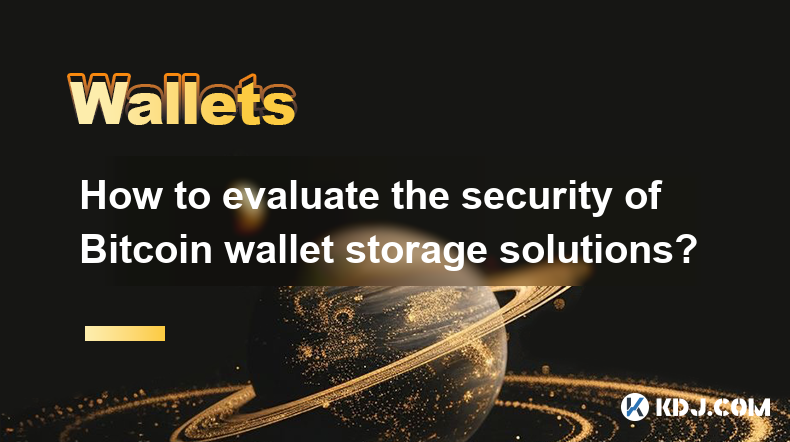
How to Evaluate the Security of Bitcoin Wallet Storage Solutions?
Choosing a secure Bitcoin wallet is crucial for protecting your cryptocurrency holdings. The security of your Bitcoin depends entirely on the security of your chosen wallet. Different wallets offer varying levels of security, making careful evaluation paramount. This article explores key factors to consider when assessing the security of various Bitcoin wallet storage solutions.
Understanding Wallet Types and Their Security Implications
Before diving into security evaluations, understanding the different types of Bitcoin wallets is vital. Each type presents a unique security profile. We have hardware wallets, software wallets (desktop and mobile), and web wallets.
- Hardware Wallets: These physical devices store your private keys offline, providing the highest level of security against hacking and malware. However, physical loss or damage remains a concern.
- Software Wallets: These wallets store your private keys on your computer or mobile device. While convenient, they are vulnerable to malware, operating system compromises, and device theft. Desktop wallets offer a bit more security than mobile ones, generally.
- Web Wallets: These are online wallets provided by third-party services. They are convenient but inherently less secure, as your private keys are stored on a server controlled by a third party. This exposes you to potential hacking and platform vulnerabilities.
Evaluating Security Features: A Detailed Breakdown
Several key features directly impact a Bitcoin wallet's security. Carefully analyzing these features is critical before choosing a wallet.
- Private Key Management: How are private keys generated, stored, and managed? Strong encryption and secure key generation processes are vital. Look for wallets that offer multiple signature options for enhanced security.
- Multi-Factor Authentication (MFA): Does the wallet support MFA? This adds an extra layer of security, requiring more than just a password to access your funds. Consider wallets that offer both hardware and software-based MFA options.
- Backup and Recovery: What options are available for backing up and recovering your wallet if your device is lost or damaged? A robust backup and recovery system is crucial for mitigating potential losses. Seed phrases are critical here.
- Security Audits: Has the wallet software undergone independent security audits? Reputable wallets will openly share audit reports demonstrating their security practices.
- Reputation and Track Record: Choose wallets from established providers with a proven track record of security and reliability. Research user reviews and look for evidence of past security breaches or vulnerabilities.
- Open-Source Code: For software wallets, consider those with open-source code. This allows independent security researchers to review the code for vulnerabilities, enhancing overall security.
Specific Security Considerations for Different Wallet Types
Let's delve deeper into security considerations specific to each wallet type.
- Hardware Wallet Security: Prioritize wallets with tamper-evident seals and robust firmware updates. Regularly check for firmware updates to patch any known vulnerabilities. Never share your seed phrase with anyone.
- Software Wallet Security: Install antivirus and anti-malware software on your device. Keep your operating system and wallet software up to date with the latest security patches. Avoid downloading wallets from untrusted sources.
- Web Wallet Security: Choose reputable web wallets with a strong security track record. Be cautious about phishing attempts and only access your wallet through trusted links. Consider using a VPN for added privacy.
Beyond the Wallet: Protecting Your Bitcoin
Even with a secure wallet, other practices contribute significantly to overall security.
- Strong Passwords: Use strong, unique passwords for your wallet and associated accounts. Consider using a password manager to help manage these passwords securely.
- Secure Internet Connection: Always access your wallet through a secure internet connection, preferably a VPN, to protect against man-in-the-middle attacks.
- Regular Security Reviews: Regularly review your wallet's security settings and practices. Stay updated on the latest security threats and best practices.
- Cold Storage: For long-term storage, consider cold storage, which involves storing your private keys offline, significantly reducing the risk of theft or hacking.
Common Questions and Answers
Q: What is a seed phrase, and why is it so important?
A: A seed phrase is a list of words that acts as a backup for your wallet's private keys. If you lose access to your wallet, your seed phrase allows you to restore it and access your funds. It's crucial to keep it safe and secure, as anyone with your seed phrase can access your Bitcoin.
Q: Are all hardware wallets equally secure?
A: No. While hardware wallets generally offer the highest level of security, the specific security features vary between different models and manufacturers. Some have better tamper resistance, more robust firmware, or more advanced security features. Research thoroughly before choosing a hardware wallet.
Q: How often should I update my wallet software?
A: Regularly update your wallet software to benefit from the latest security patches and bug fixes. The frequency depends on the wallet provider's release schedule, but generally, updating as soon as updates are available is recommended.
Q: What is the best way to protect my seed phrase?
A: Store your seed phrase offline in a safe and secure location. Consider using a metal plate, splitting the seed phrase across multiple locations, or using a secure physical document. Never store it digitally.
Q: Can I use the same password for multiple wallets?
A: No. Using the same password for multiple wallets significantly increases your risk if one wallet is compromised. Always use unique, strong passwords for each wallet.
Clause de non-responsabilité:info@kdj.com
Les informations fournies ne constituent pas des conseils commerciaux. kdj.com n’assume aucune responsabilité pour les investissements effectués sur la base des informations fournies dans cet article. Les crypto-monnaies sont très volatiles et il est fortement recommandé d’investir avec prudence après une recherche approfondie!
Si vous pensez que le contenu utilisé sur ce site Web porte atteinte à vos droits d’auteur, veuillez nous contacter immédiatement (info@kdj.com) et nous le supprimerons dans les plus brefs délais.
-
 KEEP Échangez maintenant
KEEP Échangez maintenant$0.1157
59.34%
-
 M Échangez maintenant
M Échangez maintenant$0.3105
50.86%
-
 USELESS Échangez maintenant
USELESS Échangez maintenant$0.3095
38.61%
-
 BANANAS31 Échangez maintenant
BANANAS31 Échangez maintenant$0.0246
27.74%
-
 ZBCN Échangez maintenant
ZBCN Échangez maintenant$0.0037
25.54%
-
 MAGIC Échangez maintenant
MAGIC Échangez maintenant$0.1985
21.82%
- Nexbridge, Nexplace et l'écosystème Bitcoin: construire une nouvelle frontière financière
- 2025-07-09 23:10:13
- MEXC Launchpad & Pump Token: Saisissez une remise de 40%?
- 2025-07-09 22:50:12
- Révolution du système commercial: comment XDC et la fin des télécopies sont de remodeler les finances
- 2025-07-09 23:10:13
- Ripple, Clarity Act et The XRP Case: A New York Minute on Crypto Regulation
- 2025-07-09 23:50:12
- Pas de monnaie Rs 50? Delhi HC entend pourquoi l'Inde préfère les billets
- 2025-07-09 23:15:11
- Pas de monnaie Rs 50? Delhi HC entend pourquoi les billets de banque règnent suprême
- 2025-07-09 23:50:12
Connaissances connexes
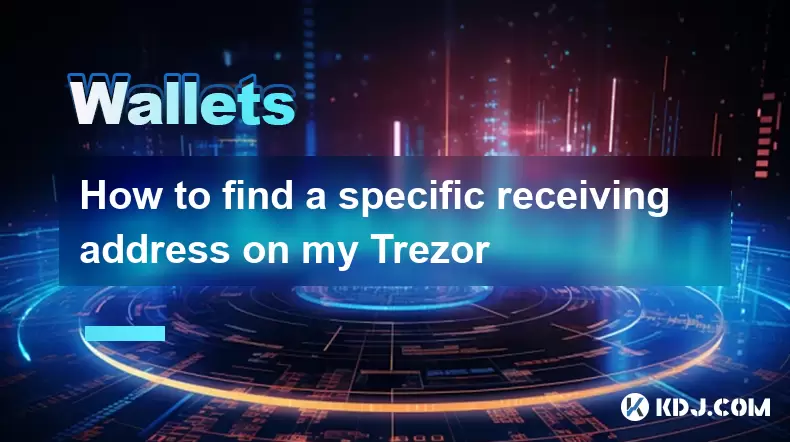
Comment trouver une adresse de réception spécifique sur mon Trezor
Jul 09,2025 at 10:36pm
Comprendre l'objectif d'une adresse de réception Une adresse de réception est un identifiant unique utilisé dans les réseaux de blockchain pou...
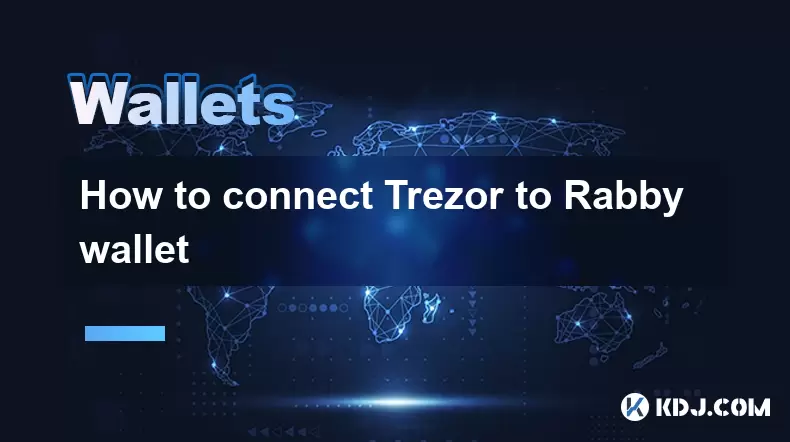
Comment connecter Trezor à Rabby Wallet
Jul 09,2025 at 05:49am
Qu'est-ce que Trezor et Rabby Wallet? Trezor est un portefeuille matériel développé par Satoshilabs qui permet aux utilisateurs de stocker en tout...
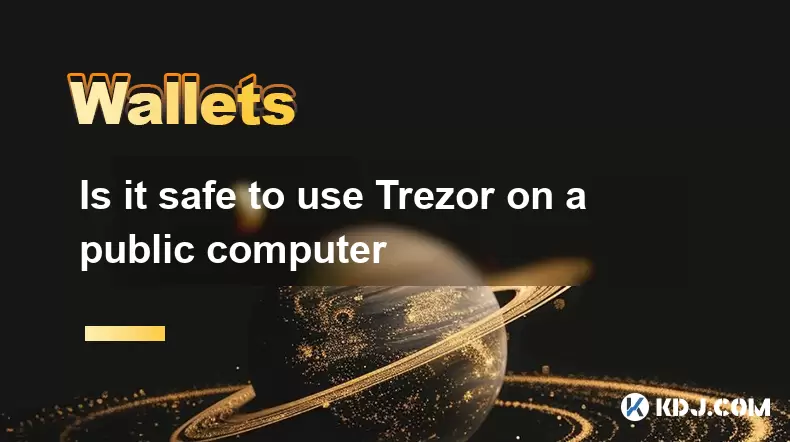
Est-il sûr d'utiliser Trezor sur un ordinateur public
Jul 09,2025 at 08:56pm
Comprendre les risques d'utiliser Trezor sur un ordinateur public L'utilisation d'un portefeuille matériel Trezor est généralement considé...
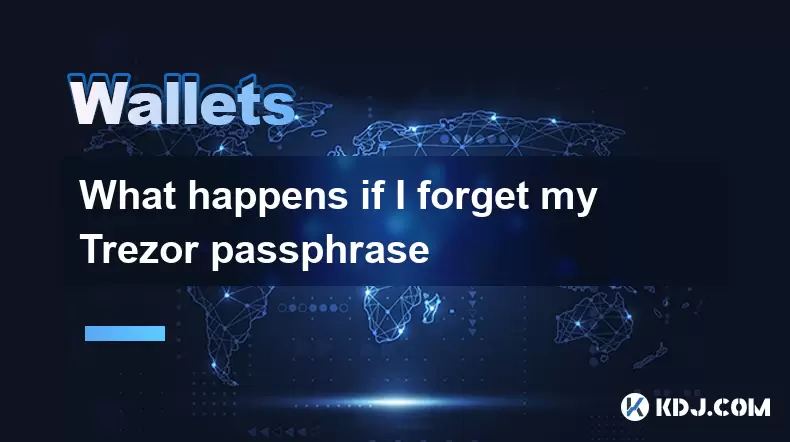
Que se passe-t-il si j'oublie ma phrase secrète Trezor
Jul 09,2025 at 03:15am
Comprendre le rôle d'une phrase secrète Trezor Si vous utilisez un portefeuille matériel Trezor , vous pouvez avoir configuré une phrase secrète c...
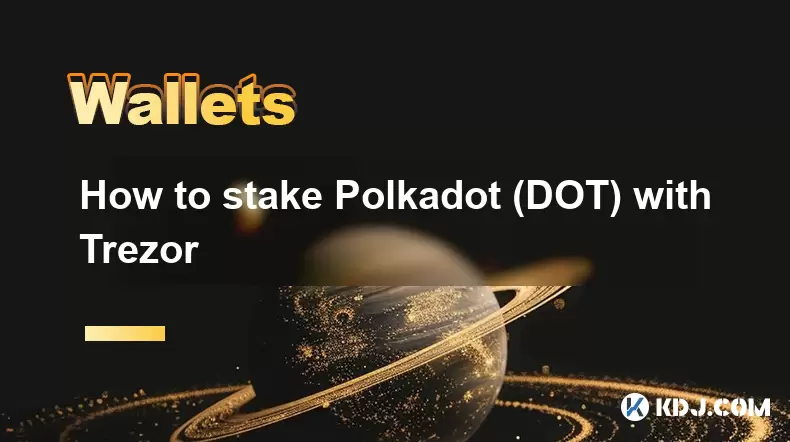
Comment jouer Polkadot (DOT) avec Trezor
Jul 09,2025 at 09:42pm
Comprendre le jalonnement de Polkadot (DOT) La mise en œuvre de Polkadot (DOT) permet aux utilisateurs de participer à la validation du réseau et de g...
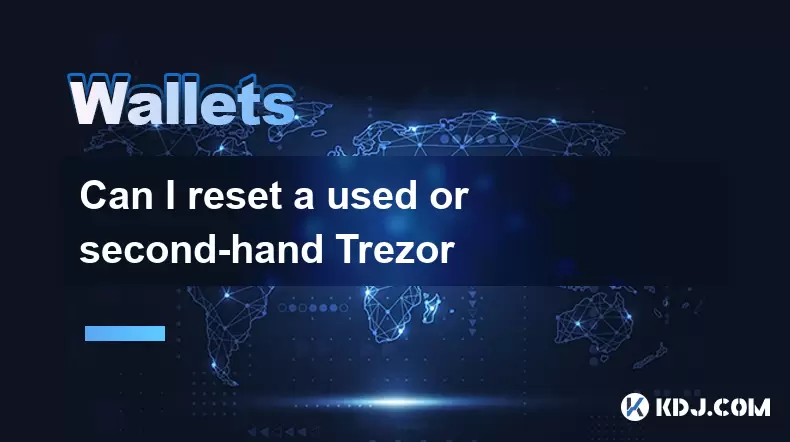
Puis-je réinitialiser un Trezor d'occasion ou d'occasion
Jul 09,2025 at 11:49am
Comprendre le processus de réinitialisation pour un Trezor d'occasion ou d'occasion Si vous avez acquis un portefeuille Trezor d'occasion ...

Comment trouver une adresse de réception spécifique sur mon Trezor
Jul 09,2025 at 10:36pm
Comprendre l'objectif d'une adresse de réception Une adresse de réception est un identifiant unique utilisé dans les réseaux de blockchain pou...

Comment connecter Trezor à Rabby Wallet
Jul 09,2025 at 05:49am
Qu'est-ce que Trezor et Rabby Wallet? Trezor est un portefeuille matériel développé par Satoshilabs qui permet aux utilisateurs de stocker en tout...

Est-il sûr d'utiliser Trezor sur un ordinateur public
Jul 09,2025 at 08:56pm
Comprendre les risques d'utiliser Trezor sur un ordinateur public L'utilisation d'un portefeuille matériel Trezor est généralement considé...

Que se passe-t-il si j'oublie ma phrase secrète Trezor
Jul 09,2025 at 03:15am
Comprendre le rôle d'une phrase secrète Trezor Si vous utilisez un portefeuille matériel Trezor , vous pouvez avoir configuré une phrase secrète c...

Comment jouer Polkadot (DOT) avec Trezor
Jul 09,2025 at 09:42pm
Comprendre le jalonnement de Polkadot (DOT) La mise en œuvre de Polkadot (DOT) permet aux utilisateurs de participer à la validation du réseau et de g...

Puis-je réinitialiser un Trezor d'occasion ou d'occasion
Jul 09,2025 at 11:49am
Comprendre le processus de réinitialisation pour un Trezor d'occasion ou d'occasion Si vous avez acquis un portefeuille Trezor d'occasion ...
Voir tous les articles

























































































